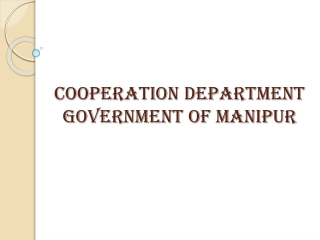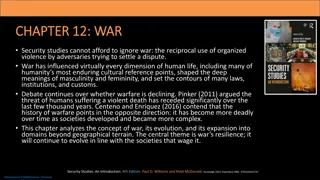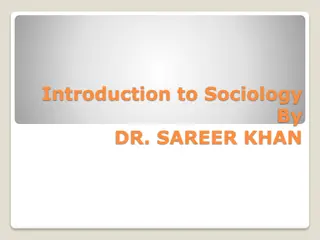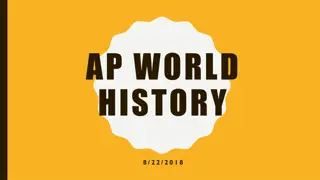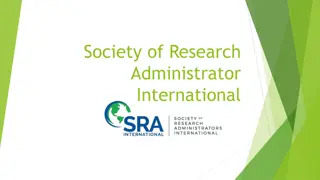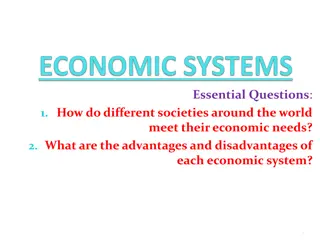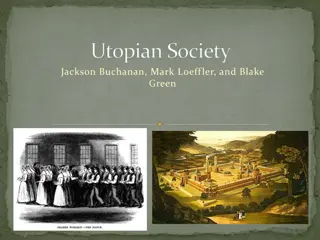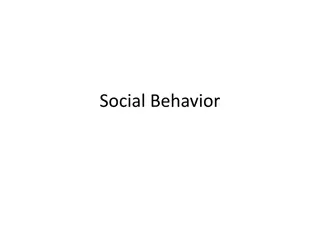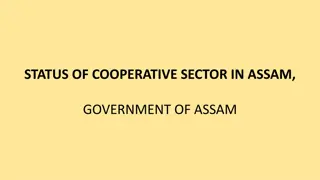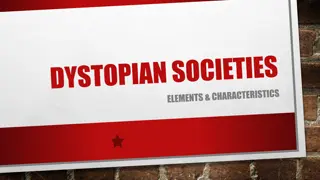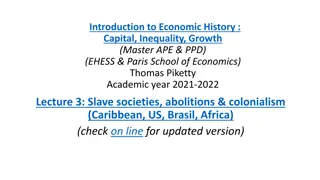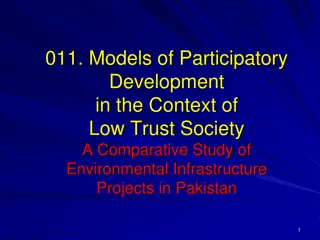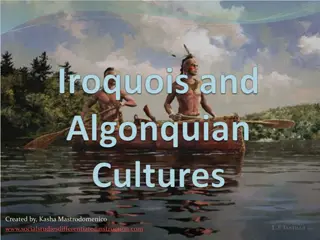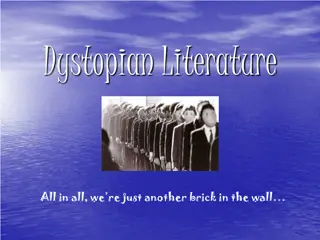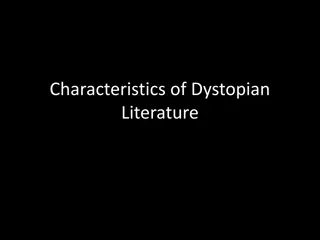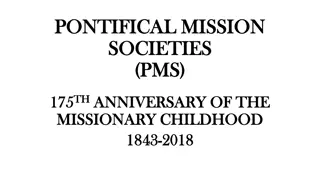Presentation on Co-operative Societies
The co-operative movement in Lakshadweep Islands, including the marketing and distribution of agricultural produce, and the role of village-level and service co-operative societies. Get insights into sales turnover and membership statistics.
5 views • 20 slides
Cooperative Societies in Arunachal Pradesh: Status and Categories
Explore the status of cooperative societies in Arunachal Pradesh with 1206 societies, 64540 members, and diverse categories from agriculture to finance. Learn about the state's two-tier Cooperative Credit Structure aiming to support farmers. Initiatives include setting up Customer Service Points wit
6 views • 15 slides
Cooperative Department of Manipur: Overview of Cooperative Movement
The Cooperative Department of Manipur is the primary agency of the government overseeing the Cooperative Movement in the state. Established in 1938, it aims to improve the socio-economic status of the people through cooperative societies. Currently, there are a significant number of registered coope
4 views • 25 slides
Evolution of Warfare and Its Impact on Society
Warfare, defined as organized violence used to settle disputes, has influenced human life profoundly. Debates persist on whether warfare is declining or becoming more deadly as societies evolve. This chapter delves into the concept of war, its evolution, and expansion into various domains beyond geo
1 views • 12 slides
Comparative Sociology
Comparative Sociology is a specialized branch that compares societies to provide generalizations, focusing on the structure and jurisdiction of groups and organizations. It involves studying affinities and disparities to predict outcomes. The discipline is closely related to Social Anthropology. Com
3 views • 15 slides
Understanding the Kanda System in Matrilineal Societies
The Kanda system was a key aspect of matrilineal descent groups that controlled land and kinship relations in C16 societies. Kandas had flexible structures, varying from hierarchical to egalitarian, with chiefs playing different roles. Key features included defined names, traditions, and autonomy in
2 views • 14 slides
The Evolution of Aquarium Societies in Texas: A Historical Journey from 1932 to 2019
Explore the history of FOTAS - the Federation of Texas Aquarium Societies, from its inception in 1952 to its evolution into a yearly convention. Discover the chronology of aquatic organizations in Texas from the 1930s, including the formation of various aquarium clubs and their contributions to the
0 views • 33 slides
Understanding Society: Basic Concepts of Sociology
Society, derived from the Latin word Socius meaning companionship, is a dynamic web of relationships that satisfy members' needs and foster a sense of belonging. Societies are characterized by cooperation, dependence, division of labor, and distinct social institutions. Factors like geography, biolo
0 views • 24 slides
Understanding Dystopian Societies in 1984 Novel Guide
Explore the themes of utopia and dystopia in George Orwell's 1984 novel through a comprehensive guide. Learn about the characteristics of dystopian societies, types of controls, and the role of protagonists in challenging oppressive systems. Dive into the discussions on propaganda, surveillance, deh
0 views • 10 slides
Introduction to Socio-Cultural Anthropology: Understanding Human Societies
Explore the holistic study of mankind in Anthropology, delving into various branches, perspectives, and the scope of Social Anthropology. Learn about the relationship of Social Anthropology with other disciplines and its significance in understanding human societies.
1 views • 9 slides
AP World History Interactions in Early Urban Societies
Interactions in early urban societies, as depicted in inscriptions, provide insights into the development of trade networks, social hierarchies, and religious influences. Questions explore the context of inscriptions, social norms, and religious practices during specific historical periods.
0 views • 8 slides
Ethics in IT-Configured Societies: Google's Controversy and Plagiarism Detection
In Chapter 3 of 'Ethics in IT-Configured Societies', various scenarios are explored such as Google's filtering practices in China and France, the ethical implications of filtering hate speech and political speech, questioning the need to know if a respondent is human or computer in instant messaging
0 views • 31 slides
Cultural Perspectives on Coming of Age and Rites of Passage
Coming of age is a significant transition from adolescence to adulthood, varying across cultures in terms of age and rituals. Different societies have unique ways of marking this change, often through formal ceremonies or rites of passage. Life stages play a crucial role in personal development, wit
5 views • 17 slides
Society of Research Administrator International - Global Research Management Community
Organizational Overview of Society of Research Administrator International, a leading global research management society with over 5,000 members from 40 countries. Providing education, professional development, and promoting best practices in research management and administration. Sister societies
3 views • 11 slides
Ancient China: Societies, Philosophies, and Dynasties
Ancient China's history is rich with the Shang, Zhou, Qin, and Han Dynasties shaping society. Various philosophies like Confucianism, Daoism, and Legalism influenced politics and culture. The Mandate of Heaven concept emphasized good governance. China's geographic location facilitated trade, notably
1 views • 16 slides
Understanding Economic Systems and Their Impacts on Societies
Explore how different societies meet their economic needs through traditional, free enterprise, and communist economic systems. Learn about the advantages and disadvantages of each system, from the customs-based decisions in traditional economies to the government-controlled operations in communist
2 views • 17 slides
Different Utopian Societies and Their Guidelines
Explore various utopian societies such as the Shakers of Pleasant Hill and Shaker Heights, along with Old Salem in NC. Discover their unique guidelines related to family, marriage, education, careers, religious beliefs, and government systems. These societies emphasize specific rules and beliefs in
0 views • 14 slides
Exploring "Brave New World": An Introduction to Dystopian Satire
This guide provides an overview of Aldous Huxley's "Brave New World," discussing its themes of propaganda, censorship, conformity, genetic engineering, and social conditioning. Delve into the novel's depiction of a controlled society, the use of technology, consumerism, and the satire employed to cr
1 views • 15 slides
Understanding Sociocultural Context in Social Behavior
Human behavior is inherently cultural due to our social nature, shaping our interactions through shared meanings and institutions. Social behaviors vary across cultures, influenced by cultural transmission. Indigenous social psychologies cater to specific societies, emphasizing the importance of rol
3 views • 58 slides
Cooperative Sector in Assam: Overview and Current Status
The cooperative sector in Assam plays a vital role in the state's rural development, with a focus on self-sufficiency and economic upliftment. The government of Assam is actively working on strengthening cooperative movements, computerizing PACs, and forming constituency-level cooperative societies.
1 views • 11 slides
Comparative Study on Methods of Working in Animal Skins Worldwide
Explore the diverse techniques, materials, and tools used by various societies around the world to work with animal skins. This exercise delves into the cross-cultural differences in skin-working technologies, the ecological relationships reflected in material choices, and the social contexts of ski
0 views • 16 slides
Understanding Utopia and Dystopia in Literature and History
Explore the concepts of Utopia and Dystopia, with a focus on their definitions, examples, and the role of dystopian literature in critiquing societal norms and systems. Discover the historical circumstances that have influenced the flourishing of dystopian fiction, along with the various types of dy
0 views • 11 slides
The Evolution from Paleolithic Societies to Agricultural Revolution
Exploring the transition from small Paleolithic societies relying on gathering and hunting to the Agricultural Revolution that brought deliberate cultivation of plants and animals. The shift marked a revolutionary transformation in human life, impacting economies, environments, spiritual beliefs, an
0 views • 12 slides
Slave Societies, Abolitions, and Colonialism: Economic History Overview
Explore the impact of slavery, abolition movements, and colonialism on economic structures in societies such as Britain, France, the USA, Brazil, Africa, and the Caribbean. Delve into the nuances of slave societies, the abolition process, extreme inequality, colonial finances, and decolonization in
0 views • 43 slides
Emerging Field of Preventative Engineering: Safeguarding Societies Against Modern Challenges
Preventative engineering emerges as a vital field focusing on mitigating potential harms, disasters, and threats to human lives and economies. By studying, designing, and creating innovative solutions, engineers play a crucial role in transforming harmful situations into positive outcomes, emphasizi
0 views • 26 slides
Participatory Development and Trust Building in Low-Trust Societies
Models of participatory development in low-trust societies highlight the failure of government-led approaches due to inequalities and distrust between government agencies and communities. Breaking this vicious circle requires establishing equitable partnerships and ensuring equal roles in planning a
0 views • 19 slides
Challenges and Solutions in Modern Societies
Understanding the importance of social welfare systems, social policies, human community needs, and various forms of capital in modern societies. The political challenge of capitalism in creating unequal distributions of capital and the central question of who is responsible for solving social probl
0 views • 24 slides
Indigenous Cultures of New York: Iroquois and Algonquian Societies
Exploring the similarities and differences between the Iroquois and Algonquian cultures in New York, their settlement patterns, and the significance of nature in their societies. The Iroquois settlements were larger and featured longhouses, while the Algonquian settlements had smaller wigwams. Both
0 views • 18 slides
The Vital Role of Religious Institutions in Supporting Immigrants
Religions and immigration are interlinked in modern societies, where religions play a significant role in providing services, defending rights, and supporting the social cohesion of immigrants. Mainstream religious institutions serve as key actors in offering assistance, advocating for migrant right
2 views • 14 slides
Understanding Dystopian Societies: A Comprehensive Overview
Explore the intricate realms of dystopian literature, delving into the contrasting notions of utopia and dystopia. Uncover the defining characteristics of dystopian societies, from oppressive controls to societal illusions. Dive into the various types of dystopian controls, including corporate, bure
0 views • 25 slides
Evolving Human Societies: From Parasitism to Mutualism with Earth
Human societies can transition from parasitic relationships with the Earth to mutualistic ones, mirroring examples from nature. Explore the concepts of parasites and mutualists in both ecological and human contexts, and consider Earth as a host and organism interconnected in delicate balance. Reflec
0 views • 7 slides
Precolonial Administration in Nigeria: Governance Systems and Structures
Nigeria's precolonial era was characterized by diverse societies with various governance structures such as the centralized Hausa/Fulani system and decentralized systems. Different kingdoms and empires existed, each with its unique social organization, political leadership, and economic activities.
0 views • 22 slides
Understanding Obligations and Fiduciary Duty of Officers in Incorporated Societies Act 1908
Explore the essential requirements and responsibilities outlined in the Incorporated Societies Act 1908 for officers serving in incorporated societies. Discover the significance of fiduciary duty and the obligations that officers must uphold to act in good faith and in the best interests of the soci
0 views • 19 slides
Activities of Societies of Aid to Polish Refugees During WWI
The activities of societies aiding Polish refugees during World War I focused on preserving their national identity. These societies provided financial, material, fuel, housing, and cultural support to the refugees. The funding for these societies transitioned from private donations to government fu
0 views • 11 slides
Understanding Dystopian Literature: Key Characteristics and Examples
Explore the characteristics of dystopian literature, including societal control, propaganda, surveillance, dehumanization, and the worship of figures or concepts. Learn how dystopias critique current trends and political systems through imagined oppressive worlds. Discover examples from popular dyst
0 views • 17 slides
Understanding Dystopian Societies and Controls
Dystopian societies, like Union Grove High School, exaggerate worst-case scenarios to criticize current trends or systems. Characteristics include propaganda, restricted freedom, and banished natural world. Types of control include corporate, bureaucratic, technological, philosophical, or religious.
0 views • 11 slides
Exploring Dystopian Worlds in Literature
Marrow Thieves presents a dystopian universe where societal control is oppressive. Dystopias criticize current trends by exaggerating worst-case scenarios. Characteristics include propaganda, limited freedom, and dehumanization. Types of control range from corporate to technological. Dystopian prota
0 views • 15 slides
Introduction to Dystopian Literature: Summer Reading Exploration
Explore the origins of utopia and its transition to dystopia in American society through a critical analysis of dystopian characteristics and control mechanisms. Discover how propaganda, surveillance, and societal oppression are depicted in dystopian literature, challenging readers to question socie
0 views • 9 slides
Language in Multilingual Societies: Embracing Diversity
In multilingual societies, people navigate daily life using multiple languages for various purposes. From home to work to prayer, different languages play a crucial role in communication and social organization. The interaction of speakers of multiple languages in such environments can lead to langu
0 views • 22 slides
Pontifical Mission Societies: Celebrating 175 Years of Holy Childhood Mission
Pontifical Mission Societies, including the Holy Childhood Society, were founded in 1843 to support mission work. The societies focus on children helping children, with initiatives like Holy Childhood Day. Learn about their history, founders, and mission collections.
0 views • 20 slides


